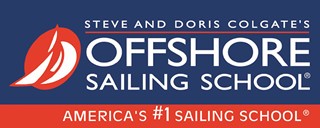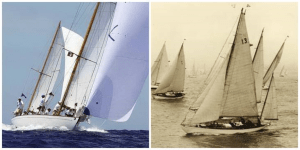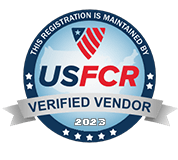The Transatlantic Race – Past and Present
Starting June 28, 2015 forty-one yachts ranging from 40’ to 125’ will set sail from the Castle Hill Light at Newport, RI to the finish line at the Lizard, the most southerly point on the mainland of Great Britain.
History in the Making
The 85 year old Dorade won this race on the same course in 1931 and is hoping to recreate that win this year. That’s Dorade in 1931 on the right, and today on the left. If you look at the old videos of this race on You Tube, you’ll see that they crossed the Atlantic steering with a tiller, not a wheel. That’s a lot of work when you hit heavy air! All eyes will be on this celebrated 52’ yawl, now owned by Californians Pam Levy and Matt Brooks, whose goal is to beat the 17 days, one hour and 14 minutes it took Dorade to sail this course 84 years ago.
Newport, RI – Where Racers Go to Race
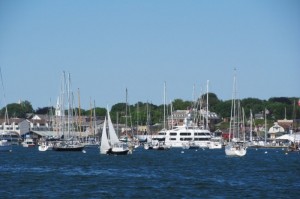 The last Transatlantic Race was in 2011, with half as many boats. I can’t wait to get up to Newport, RI to view the fleet, with a slight twinge of regret that I won’t be on the starting line this time around.
The last Transatlantic Race was in 2011, with half as many boats. I can’t wait to get up to Newport, RI to view the fleet, with a slight twinge of regret that I won’t be on the starting line this time around.
I spent the summer of 1967 living at Castle Hill while competing in the America’s Cup 12 Metre trials on American Eagle; and the summer of 1970 in Newport again, racing in the America’s Cup Trials when I was tactician on the 12 Metre Heritage.
Always a Learning Experience
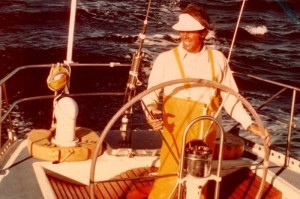 I’ve sailed in six Transatlantic Races and each one was a learning experience, each with its own personality. The striking thing about all of them was the peaceful isolation of being out at sea for long periods of time. Within days you get into a routine of watch systems.
I’ve sailed in six Transatlantic Races and each one was a learning experience, each with its own personality. The striking thing about all of them was the peaceful isolation of being out at sea for long periods of time. Within days you get into a routine of watch systems.
Nothing else but sailing at the greatest possible speed concerns you. The world could be blowing up, but your world is the boat, your crew mates and the challenges at the time. You are living completely in the present and all other concerns are banished.
Lost Rudder 1000 Miles from England
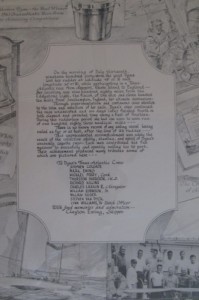 The other extraordinary take away is no matter how bad things get you are responsible for your own fate. In the 1963 race on Dyna – from Newport, RI to Eddystone Light, England – we lost our rudder about 1000 miles from England and finished 4th out of 14 boats, steering with just the sails.
The other extraordinary take away is no matter how bad things get you are responsible for your own fate. In the 1963 race on Dyna – from Newport, RI to Eddystone Light, England – we lost our rudder about 1000 miles from England and finished 4th out of 14 boats, steering with just the sails.
Dyna’s owner, Clayton Ewing, created this tribute for crew members, declaring the real winners were the team that got us to England without a rudder!
No matter what Mother Nature has in store, you know you will handle breakdowns if they occur, and a new beautiful day will dawn soon.
Obstacles and Outcomes
In another race we were sailing in a pea soup fog off the Grand Banks, famous for fishing fleets. We had no radar and I was steering. My positon is usually watch captain. The amazing thing about sailing in fog is the utter silence. Fog seems to deaden all noise and the wind is often off the water, so the seas are flat. Suddenly, I heard a blast of a fog horn dead ahead. I swerved to leeward, narrowly missing a large fishing boat.
2nd in Class – Marblehead, MA to Cork, Ireland
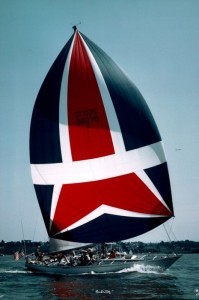 In 1979, I was thrilled to come in second in our class on our own 54’ Frers Sleuth on the race from Marblehead, MA to Cork, Ireland. Though Doris normally raced with me, she decided to fly over and meet the boat. We had spent endless nights together preparing all the meals in our one-bedroom Manhattan apartment, freezing them in seal-a-meal bags and getting the galley ready for our cook/doctor to take over.
In 1979, I was thrilled to come in second in our class on our own 54’ Frers Sleuth on the race from Marblehead, MA to Cork, Ireland. Though Doris normally raced with me, she decided to fly over and meet the boat. We had spent endless nights together preparing all the meals in our one-bedroom Manhattan apartment, freezing them in seal-a-meal bags and getting the galley ready for our cook/doctor to take over.
This photo of Sleuth was taken off the Isle of Wight in a day-race prior to the infamous 1979 Fastnet Race where winds blew over 80 knots and 15 on other boats died. We won our class in that race – subject of another story some time.
1955 – Cuba to San Sebastian, Spain
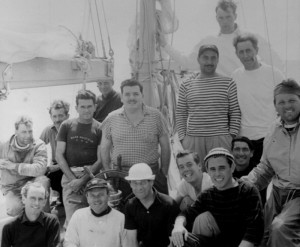 My first Transatlantic Race was in 1955 from Havana, Cuba to San Sebastian, Spain on a 72’ yawl called Mare Nostrum. That’s me with the Mare Nostrum crew, fourth from the left with no hat and a great big smile!
My first Transatlantic Race was in 1955 from Havana, Cuba to San Sebastian, Spain on a 72’ yawl called Mare Nostrum. That’s me with the Mare Nostrum crew, fourth from the left with no hat and a great big smile!
I was the youngest aboard, and my main job was to lay down in the bow to reduce windage and “call the jib” – tell the helmsman and the trimmers if we were sailing too high or too low, and call for trimming or easing the headsails. Off Cape Hatteras at night the bow (and me) went under water. I got out of there as fast as I could and found the crew reefing the mainsail. The brake failed on the winch and the handle started spinning. It cracked some bones in one crew member’s wrist. Such was my initiation that transatlantic racing can be dangerous.
90% Sheer Bliss
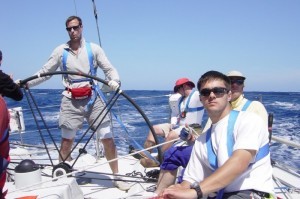 But, truthfully, racing across the Atlantic Ocean is not all danger, fog and breakdowns. There is an old adage that sailing is 90% sheer bliss and 10% panic.
But, truthfully, racing across the Atlantic Ocean is not all danger, fog and breakdowns. There is an old adage that sailing is 90% sheer bliss and 10% panic.
Of the six Transatlantic races, 20 Newport to Bermuda Races and a multitude of other ocean competitions I’ve done – my fondest memories are of living, working, and celebrating with my mates. I took this photo of some of the crew on 72’ Donnybrook in the 2008 Newport to Bermuda Race.
The men and women I’ve shared these experiences with on long distance racing have numbered from 12 to 26, on boats from 48’ to 82’. Everyone has a job, everyone knows we have each other’s backs, everyone is there for the challenge and the communal and personal rewards of being able to say, “I did it! We did it together!”
How to Follow the 2015 Transatlantic Race
You can find more information on the 2015 Transatlantic Race at http://transatlanticrace.org/, and on Facebook. Offshore Sailing School has a great training program for competitive sailing, take a look. No matter what size boat you end up racing, learning on fast, responsive one-designs like our Colgate 26s really lays the groundwork for competitive sailing and that’s how most successful big boat long distance racers start out.
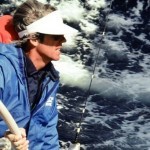 Written by Steve Colgate, Six-Time Transatlantic Racer
Written by Steve Colgate, Six-Time Transatlantic Racer
Founder and Chairman of Offshore Sailing School
